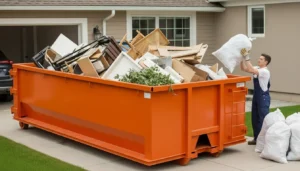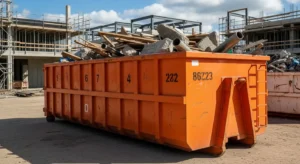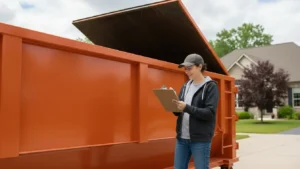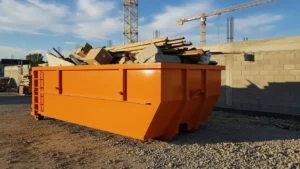Introduction
When you rent a dumpster for your project—whether it’s spring cleaning, a home renovation, or a construction job—you’re likely to ask, “What can you put in a dumpster?” It’s a critical question, especially because not everything is permitted in a roll-off dumpster. Knowing what you can and can’t dispose of will help you avoid extra charges, fines, and environmental hazards.
This complete disposal guide will walk you through acceptable materials, restrictions, best practices, and tips for getting the most out of your dumpster rental.
Why It’s Important to Know What Goes in a Dumpster?
Before you start filling up your dumpster, it’s essential to understand what’s allowed and what isn’t. Throwing in the wrong items can lead to more than just a messy load—it can result in extra charges, delayed pickups, and even fines from your local municipality.
Certain materials, like hazardous chemicals or electronics, are banned from landfills due to safety and environmental concerns. If these items end up in your dumpster, the rental company may reject the load entirely or charge you for specialized disposal.
By knowing what’s acceptable ahead of time, you protect yourself from unexpected costs, keep your project on schedule, and ensure your waste is handled responsibly. It’s a simple step that makes a big difference for your wallet—and the environment.
What Can You Put in a Dumpster?
Most general-use dumpsters accept a wide range of non-hazardous waste. Here’s a look at what’s typically allowed:
1. Household Junk and Debris
Residential cleanouts are among the most common reasons for renting a dumpster. The following are generally accepted:
- Old furniture (couches, chairs, tables)
- Clothing and textiles
- Toys, books, and cardboard boxes
- Dishes, cookware, and non-electronic kitchenware
- Carpets and rugs
If you’re decluttering your basement, attic, or garage, these items can safely go into a standard dumpster.
2. Yard Waste
Many dumpster rental companies allow yard debris, although local regulations may vary. Accepted materials typically include:
- Grass clippings
- Leaves and small branches
- Shrubs and brush
- Garden waste
Some areas may even have specific dumpsters for organic waste, ideal for landscaping projects.
3. Construction and Demolition Debris
For remodels or home construction, roll-off dumpsters are a go-to solution. You can usually toss:
- Drywall
- Wood and lumber
- Flooring materials (tile, laminate, vinyl)
- Roofing shingles
- Bricks and concrete (in small quantities)
Keep in mind that very heavy materials like bricks and concrete may have weight limits or require a separate dumpster.
4. Non-Hazardous Appliances
Some appliances are allowed as long as they don’t contain hazardous chemicals or refrigerants. For example:
- Microwaves
- Ovens
- Washing machines
- Dryers
Always check with your dumpster provider before disposing of large appliances, especially refrigerators or air conditioners.
5. Electronics (In Small Amounts)
You can dispose of certain electronics like old keyboards, DVD players, or broken phones in small quantities. However, many areas restrict large-scale e-waste disposal due to environmental concerns. For bulk disposal, seek a dedicated e-waste recycling facility.
What You Cannot Put in a Dumpster?
Now that we’ve covered what’s allowed, let’s go over the prohibited items. These are typically banned by law or pose risks to sanitation workers, the environment, or local landfill guidelines.
1. Hazardous Materials
This is the most strictly regulated category. Hazardous waste includes items that are flammable, toxic, corrosive, or reactive. These materials must never go in a dumpster:
- Paints, stains, and lacquers (unless dried)
- Motor oils and automotive fluids
- Pesticides and herbicides
- Cleaning chemicals and solvents
- Batteries (especially lithium and lead-acid types)
Improper disposal of these items can result in significant fines and damage to ecosystems.
2. Tires
Tires are banned in most landfills because they do not break down easily and can damage processing equipment. Special recycling programs exist for tire disposal, often through auto shops or municipal facilities.
3. Medical Waste
This includes:
- Used syringes
- Expired medications
- Soiled gloves or bandages
Disposing of medical waste in dumpsters is not only unsafe but also illegal. Medical waste must be handled through designated biohazard programs.
4. Large Electronics and Televisions
While some dumpster rental services allow small electronics, large items like CRT TVs, monitors, and printers often require special handling. Many states have e-waste recycling laws that prohibit these from entering landfills.
5. Propane Tanks and Gas Cylinders
Even if they appear empty, propane tanks and gas cylinders can explode under pressure and are never safe to throw in a dumpster. Instead, return them to a refill station or hazardous waste facility.
Special Disposal Rules: Local Regulations Matter
Not all dumpsters accept the same items, and local regulations play a key role in what you can and can’t toss. Some municipalities:
- Restrict yard waste during certain seasons
- Require the recycling of metal and appliances
- Limit the disposal of construction materials
Before renting a dumpster, ask your provider about city- or county-specific rules, especially if you’re renting in urban areas with strict environmental codes.
Dumpster Size Matters
Another consideration when deciding what to put in a dumpster is size and weight limit. Overloading a dumpster or tossing in heavy debris like concrete can incur overage fees. Common dumpster sizes include:
10-yard: Good for small cleanouts or yard waste
20-yard: Suitable for home renovation or remodeling
30-yard: 30-Yard Dumpster is ideal for large construction projects
40-yard: Best for full demolitions or commercial use
If your project includes both general junk and heavy material (like shingles or bricks), it may be worth renting two smaller dumpsters instead of one large one to avoid weight issues.
Tips to Maximize Dumpster Space
Using your dumpster efficiently helps you save money and reduce the number of hauls:
- Break down large items like furniture or boxes before tossing them in.
- Distribute weight evenly—especially with construction debris.
- Stack items tightly to reduce air pockets and wasted space.
- Keep prohibited items separate to avoid penalties.
Also Read: How Much Does It Cost to Rent a Dumpster?
What to Do with Restricted Items?
Just because certain materials can’t go into a dumpster doesn’t mean you’re stuck with them. Many restricted items have safe, legal disposal options that are easy to access. Here’s how to handle them responsibly:
Paints, Solvents, and Chemicals
Most communities organize hazardous waste collection events where you can safely drop off paint, stains, and cleaning chemicals. Some hardware stores and recycling centers also accept leftover paint or solvents for proper disposal.
Tires
Tires are not allowed in dumpsters or landfills, but they can often be returned to tire retailers or local auto shops. Many recycling facilities will also accept used tires, sometimes for a small fee.
Electronics
Old TVs, computer monitors, laptops, and other large electronics should be taken to certified e-waste recycling centers. Many electronics stores and manufacturers also offer take-back programs, especially for outdated devices.
Medical Waste
Sharps, expired medications, and biohazardous materials should never go into the trash or a dumpster. Instead, use disposal kiosks at pharmacies or consult local hospitals and health departments for approved programs.
Propane Tanks and Gas Cylinders
Even when empty, propane tanks are highly dangerous if tossed into a dumpster. Return them to a gas supplier, hardware store, or a hazardous waste facility that handles pressurized containers.
Final Thoughts
Knowing what can go in a dumpster makes your project smoother, safer, and more environmentally responsible. While household junk, yard waste, and renovation debris are generally acceptable, hazardous items like chemicals, tires, and medical waste must be handled separately. Always check with your dumpster rental provider and local municipality for precise guidelines.
By following this complete disposal guide, you not only avoid potential fines but also help maintain cleaner neighborhoods and healthier ecosystems.
Contact us today for affordable rates, fast delivery, and expert support customized to your cleanup needs.




